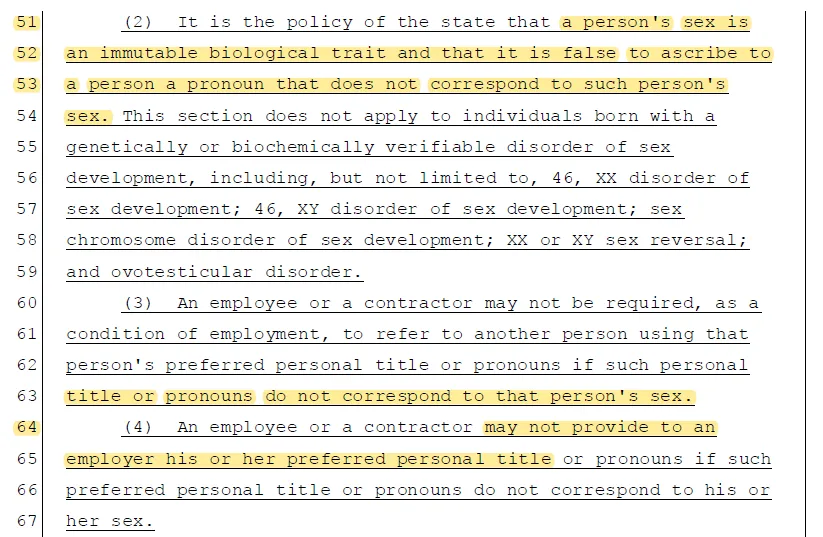Florida
Newly introduced Florida bill could destroy LGBTQ+ nonprofits
The legislation would establish “biological” pronouns as official state policy applying to government employees and contractors
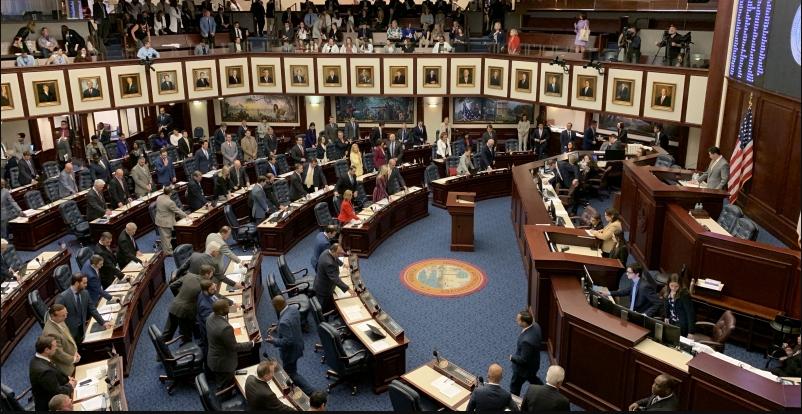
By Erin Reed | TALLAHASSEE, Fla. – A new bill just introduced in Florida aims to expand “Don’t Say Gay Or Trans” provisions to a broad range of workplaces. Targeting government employees, contractors, and nonprofits, the bill sets forth restrictions and bans on policies relating to pronouns, gender identity, and sexuality.
Specifically, it would prohibit state and local government employees as well as any contractors engaged with the government from changing their pronouns or honorifics if they do not match their assigned sex at birth. It would also bar them from instructing on gender identity or sexuality, similar to “Don’t Say Gay Or Trans” laws already active in the state education system. The legislation would establish “biological” pronouns as official state policy.
The bill also would establish protections for what it calls “deeply held biology-based beliefs.” It may even prevent all nonprofits in the state from mandating any “training, instruction, or other activity on sexual orientation, gender identity, or gender expression,” a clause that could destroy LGBTQ+ nonprofits across Florida.
The bill, HB599, was introduced by Representative Ryan Chamberlin, a Republican. The bill is split into two sections, with the first section applying to government employees and contractors, which it defines as “an individual, partnership, corporation, or business entity” that “enters or attempts to enter into a contract for services” with any state, county, municipality, or special district of Florida.
These definitions encompass a huge number of businesses, such as stadiums, convention centers, major hospitals, insurance agencies, and more. For these businesses, as well as for all government workers, the bill would declare that it is the state’s policy that “a person’s sex is an immutable biological trait and that it is false to ascribe to a person a pronoun that does not correspond to such person’s sex.” It then would bar covered employees from sharing pronouns that “do not correspond to that person’s sex,” effectively banning social transition at work for these employees.
See the provisions barring pronouns, honorifics, and more here:
The bill also would enshrine a new phrase into law: protections for employees “deeply held religious or biology-based beliefs.” The phrase “deeply held religious beliefs” has longstanding precedent in constitutional law and is used to overturn laws judged to be violating someone’s freedom of religion.
Deeply held “biology-based” beliefs, however, are not something that has ever been a part of any law. It would appear that this line is meant to provide religious-based protections to people who assert that their misgendering of transgender people and using transgender people’s old names is part of their “biology-based” rights.
The bill is not limited in its application to government employees and contractors, however. A separate section of the bill would apply to “nonprofit organizations or an employer who receives funding from the state.” In the most broad reading of this section, separating “nonprofit organizations” from “employers who receive funding from the state,” it would bar all such organizations from mandating “training, instruction, or other activity on sexual orientation, gender identity, or gender expression.”
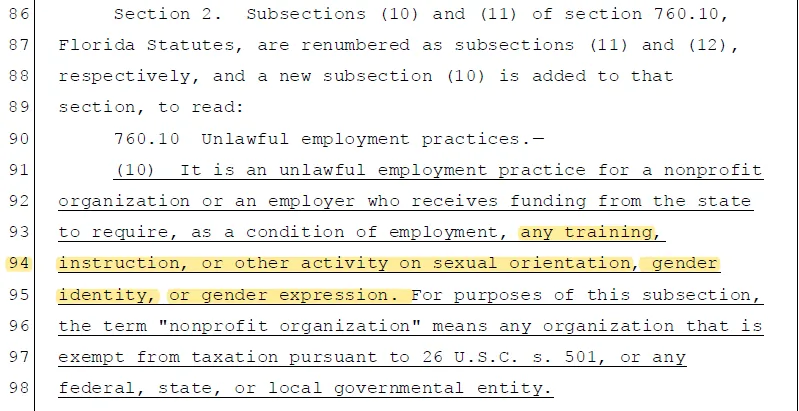
This provision is severe in its potential impact. Virtually every LGBTQ+ organization would be radically affected by it and would likely have to shut down. It would be nearly impossible for an LGBTQ+ organization to run without providing instruction, training, and “other activity” around gender identity or sexuality. It would be a blatant power grab by the state targeting organizations critical to the government and would further drive LGBTQ+ activism and organizing underground in the state. If enforced broadly, this section could have a similar impact to laws in Russia designed to shut down LGBTQ+ organizations there.
This section would have impacts far beyond LGBTQ+ organizations as well. The provisions would apply to “any organization that is exempt from taxation” including “s. 501” organizations. This would include, for instance, 501c4s, which are crucial during election cycles and could be used to target left-leaning organizations running election ads. Many of these organizations have LGBTQ+ employees and provide instruction and accommodations for their employees, which would be barred by the state if this gets passed into law.
It could also have impacts on medical organizations that do business with state and local governments. Planned Parenthood, a 501c3, heavily provides care for LGBTQ+ people, and such a law could be used to target the organization statewide. Likewise, many state hospital systems that do business with the government often must educate employees and patients on HIV and AIDs, which is impossible to divorce from LGBTQ+ issues. Community health clinics would, similarly, have to contend with these provisions.
'Don't say gay' for nonprofits: @RyanDChamberlin files bill that would restrict LGBTQ nonprofits receiving state funding
— Florida Politics (@Fla_Pol) November 21, 2023
Reporting by @JacobOgleshttps://t.co/oaAfC0gTuz#FlaPol
Brandon J. Wolf, the National Press Secretary for the Human Rights Campaign said to the Blade in a statement Tuesday: “This Florida bill is a hateful, anti-LGBTQ+ monstrosity. It is dangerous, unconstitutional, and we know it’s just the start of politicians’ attacks on our community this legislative session. We’re prepared to fight back.”
This legislation represents an early move in what promises to be a challenging year for anti-LGBTQ+ legislation in 2024. Historically, Florida has often been the breeding ground for new laws aimed at the LGBTQ+ community. This bill might well serve as a precursor to the next “model policy” that could be replicated in multiple states, and bears close watching.
****************************************************************************

Erin Reed is a transgender woman (she/her pronouns) and researcher who tracks anti-LGBTQ+ legislation around the world and helps people become better advocates for their queer family, friends, colleagues, and community. Reed also is a social media consultant and public speaker.
Follow her on Twitter (Link)
Website here: https://www.erininthemorning.com/
******************************************************************************************
The preceding article was first published at Erin In The Morning and is republished with permission.
Florida
Tampa trans woman qualifies to run for state House seat
LGBTQ activist Ashley Brundage aims to become the first transgender elected official in Florida history as she faces a primary challenge
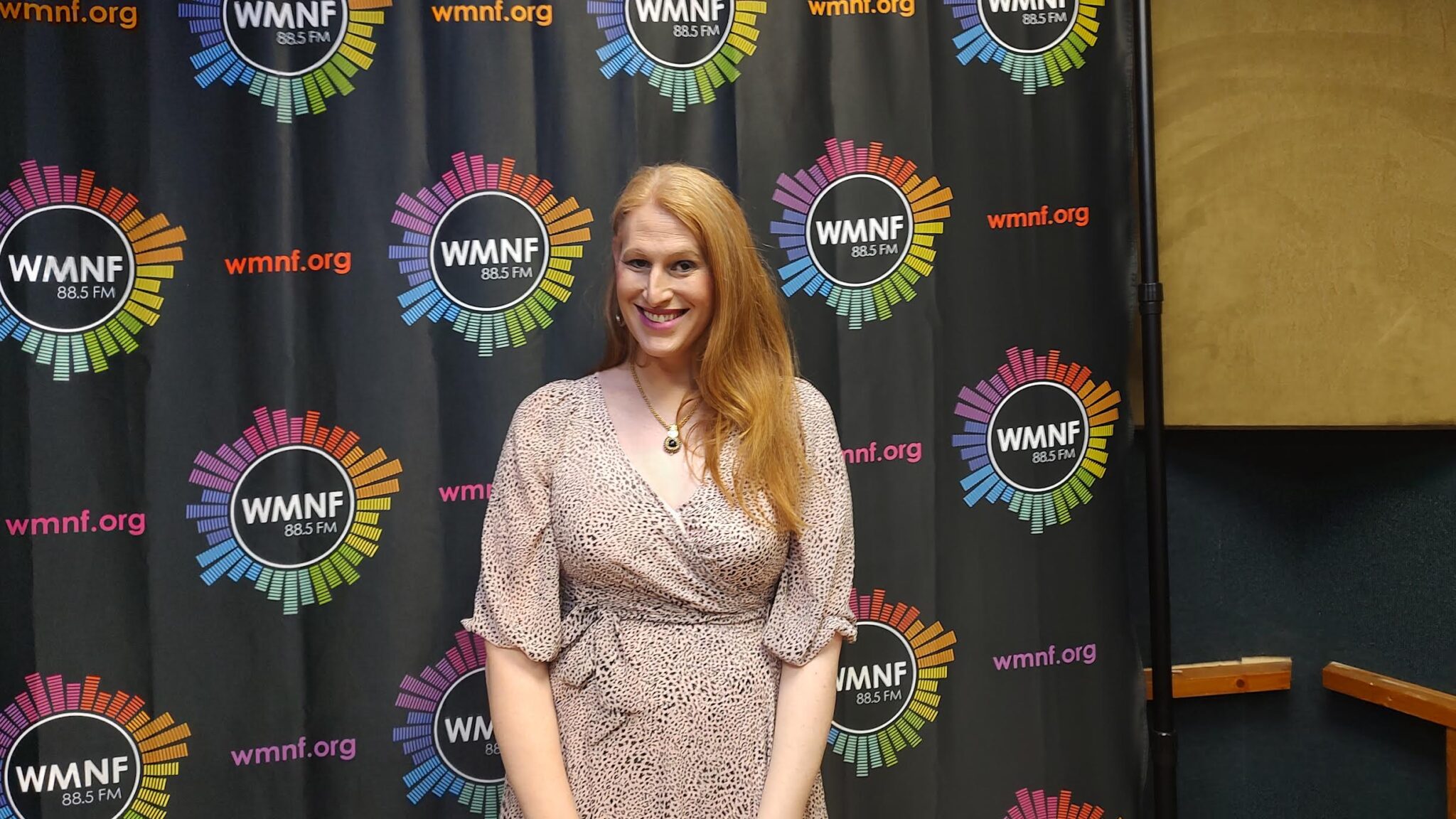
By Mitch Perry | TAMPA, Fla. – The Florida Democratic Party boasted as candidate qualifying closed Friday that for the first time since the state Legislature flipped red three decades ago, it has a Democrat running for every state House and Senate district.
That includes Hillsborough County’s 65th House District, where Ashley Brundage hopes to make history by becoming the first transgender person elected to serve in Tallahassee.
“While I’m going to be making history on something like me and my personal life, which really has no impact on anything, but what I think is even more history-making is that I used to be the DEI person for PNC Bank and 60,000 employees as their national president of diversity, equity, inclusion,” she said on Friday, speaking on WMNF 88.5 FM radio in Tampa (on a show which this reporter participated in).
Yes, that’s right. If running as a transgender woman isn’t cutting enough against the established conservative grain in Florida politics in 2024, then touting her credentials as the “DEI candidate” certainly is.
“Florida is where DEI goes to die … ,” Gov. Ron DeSantis wrote on X in March, responding to a report that the University of Florida was eliminating all diversity, equity, and inclusion employee positions to comply with new Florida Board of Governors regulations.
That board defines DEI as “any program, campus activity, or policy that classifies individuals on the basis of race, color, sex, national origin, gender identity, or sexual orientation and promotes differential or preferential treatment of individuals on the basis of such classification.”
Brundage says her history as vice president of DEI at PNC Bank as well as her work with her own small business, Empowering Differences, which does diversity, equity, and inclusion training for companies, has shown her the benefits of such programs.
“Inclusion also shouldn’t be scary,” she said.
“Because inclusion is literally the opportunity for us to learn and grow as people. And that’s what every program I’ve ever built that had DEI in mind, was an opportunity for someone to learn about a community, and then go and sell more goods and services to make more money from that community,” Brundage continued.
“And that’s what happened when I became a part-time bank teller at PNC Bank while I was homeless, living in Tampa. I showed up on day one and, ultimately, I started building relationships in my community, and I started bringing those people to bank at PNC Bank. Because it wasn’t people they were literally marketing to immediately. So, by them practicing diversity, I became the number-one revenue producing employee for three straight years out of all of the entire bank around the country.”
Representing Tampa
House District 65 encompasses most of South and downtown Tampa, as well as a portion of northwest Hillsborough County, and has been held since 2022 by Republican Marilyn Gonzalez Pittman, who succeeded Republican Jackie Toledo.
It’s a seat that breaks down as 39% Republican, 31% Democratic, and 30% NPA (non-party-affiliated) and other third-party registered voters as of Feb. 20, according to the Florida Division of Elections.
Brundage calls those NPA voters “the secret sauce to our win.”
“And the Republicans are scared about that, because they’ve been running on all of these issues that are all about scaring people and hurting our economy long term,” she said, adding that she’s running on issues such as lowering the cost of property insurance, getting the government out of making decisions about people’s bodies, and economic empowerment for small businesses.
Brundage is running in a state not considered friendly to the LGBTQ community, to say the least. Under Gov. Ron DeSantis, Florida has been a leader in passing anti-LGBTQ laws. One of those laws, banning minors from receiving gender-affirming health care, was struck down by a federal judge in Tallahassee earlier this week.
The day after that decision, DeSantis predicted in Tampa that the state would win its appeal at the U.S. Court of Appeals for the Eleventh Circuit. “This has already been decided by the Eleventh Circuit Court of Appeals. They upheld Alabama’s law, which was almost identical to Florida’s law. This will be reversed. There’s no question it will be reversed,” the governor said.
Community award
Brundage received a “Spirit of the Community Award” for her work from the Florida Commission on the Status of Women two years ago. While DeSantis did not attend the awards ceremony in West Palm Beach, he did sign a letter telling her to “keep up the great work!”
Brundage said on Friday that the governor didn’t initially respond to media inquiries about why he had given tribute to a transgendered woman until she announced in April that she was running for a legislative seat and his team responded to the U.K. Daily Mail.
The publication wrote that “a source close to DeSantis told Daily.Mail.com that the commendation was bestowed because the governor’s team was under the impression that Brundage was a biological female. When it was revealed that was not the case, the congratulation letter was removed from the governor’s website.”
Brundage doesn’t believe that. “If he had read the actual nomination before signing the letter, he would have known” about her transgender status, she said.
Brundage is not the Democratic candidate for HD 65 yet, as she faces a primary challenge from Nathan Kuipers in the Aug. 20 primary. Gonzalez Pittman hasn’t drawn an opponent in her primary and will face the winner of the Brundage-Kuipers race on Nov. 5.
Note: Ashley Brundage spoke Friday on WMNF’s “The Skinny” program, for which this reporter is a co-host.
******************************************************************************************

Mitch Perry has covered politics and government in Florida for more than two decades. Most recently he is the former politics reporter for Bay News 9. He has also worked at Florida Politics, Creative Loafing and WMNF Radio in Tampa. He was also part of the original staff when the Florida Phoenix was created in 2018
******************************************************************************************
The preceding article was previously published by The Florida Phoenix and is republished with permission.
The Phoenix is a nonprofit news site that’s free of advertising and free to readers. We cover state government and politics with a staff of five journalists located at the Florida Press Center in downtown Tallahassee.
We’re part of States Newsroom, the nation’s largest state-focused nonprofit news organization.
Florida
Openly gay Carlos Guillermo Smith elected to Florida State Senate
He is the second gay man elected to the Florida Senate, after Sen. Shevrin Jones, a Miami Gardens Democrat
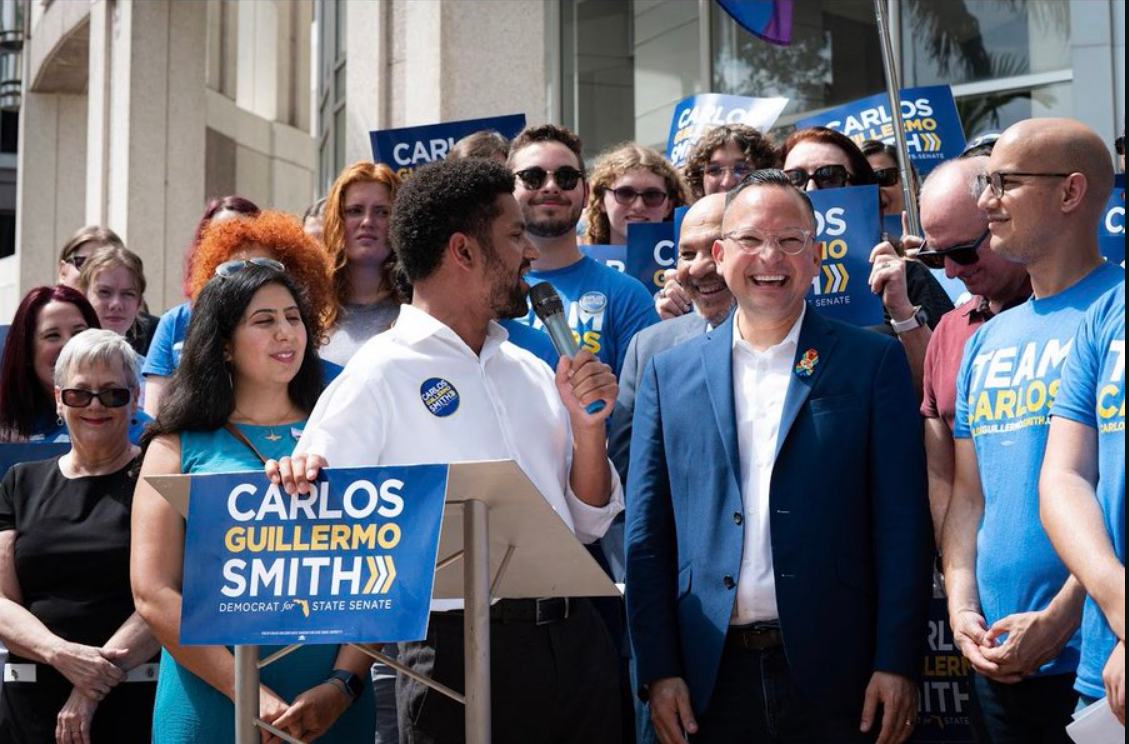
ORLANDO, Fla. — Former State Representative Carlos Guillermo Smith officially won his race for the Florida State Senate (District 17), becoming the second openly LGBTQ member elected to the chamber in state history.
“He’s making history AGAIN as the 1st LGBTQ+ Latino in the Florida Senate. Together, we’re growing the multi-racial, multi-generational, working-class movement in Central Florida. Let’s go!” said Democratic U.S. Rep. Maxwell Alejandro Frost who represents Central Florida in the House.
In 2022, while seeking reelection to the Florida House, Guillermo Smith was targeted by the Florida State Republican Party, who invested millions campaigning to defeat him. Now less than two years after losing his re-election, Guillermo Smith won election unopposed to succeed Democratic State Senator Linda Stewart.
In a statement to reporters, Senator-elect said:
“My heart is full of gratitude for this community who has entrusted me with the responsibility of serving as their state Senator,” Smith said.
“Since last year, our campaign has knocked on over 10,000 doors in Senate District 17. We know that voters are frustrated with the direction our state has been heading and they’ve had enough. Rents and property insurance premiums are soaring, over a million Floridians have recently lost health care, and Tallahassee has turned our classrooms into political battlefields.”
🚨 WE WON! 🎉 Today we became the only candidate to officially qualify for SD 17, winning election to a four-year term in the Florida Senate!
— Carlos Guillermo Smith (@CarlosGSmith) June 14, 2024
My heart is full of gratitude for the overwhelming support from my beloved Orlando community. Thank you for entrusting me to serve. 🇺🇸🗳️ pic.twitter.com/J6uaZdeHAb
Smith served in the House for six years, where he was among the most outspoken progressive activists in the Democratic minority. He was also the first openly gay Latino LGBTQ member of the House, and will soon hold the same distinction in the Senate.
He is the second gay man elected to the Senate, after Sen. Shevrin Jones, a Miami Gardens Democrat.
During his time in the House, Smith developed a reputation both as a progressive champion and a scorn of conservatives. The onetime Orange County Democratic Party Chair represented a University of Central Florida-centric district for three terms, first elected in 2016.
The Florida Senate now has an LGBTQ+ caucus of TWO! Congratulations, Senator-Elect, @CarlosGSmith ❤️💙💛💚🧡
— Shevrin “Shev” Jones (@ShevrinJones) June 14, 2024
Happy Pride! 💪🏾 pic.twitter.com/32nudokUmi
Stratton Pollitzer, Chair of Equality Florida Action PAC, said in a press release:
“We’re thrilled that voters are sending Carlos back to Tallahassee to continue the fight in the Florida Legislature. Carlos is an unflinching progressive and one of the governor’s sharpest critics. He consistently exposes the governor’s lies, hypocrisy, and agenda to strip away our rights and freedoms. When the governor hid public information from voters, Carlos took him to court and won. Carlos is on the front lines, working to ensure the safety and well-being of all Floridians.”
Florida
Pulse, a reflection: Eight years ago 49 lives were stolen
Brandon Wolf, a Pulse survivor who now serves as national spokesman for the Human Rights Campaign, called for a safer future
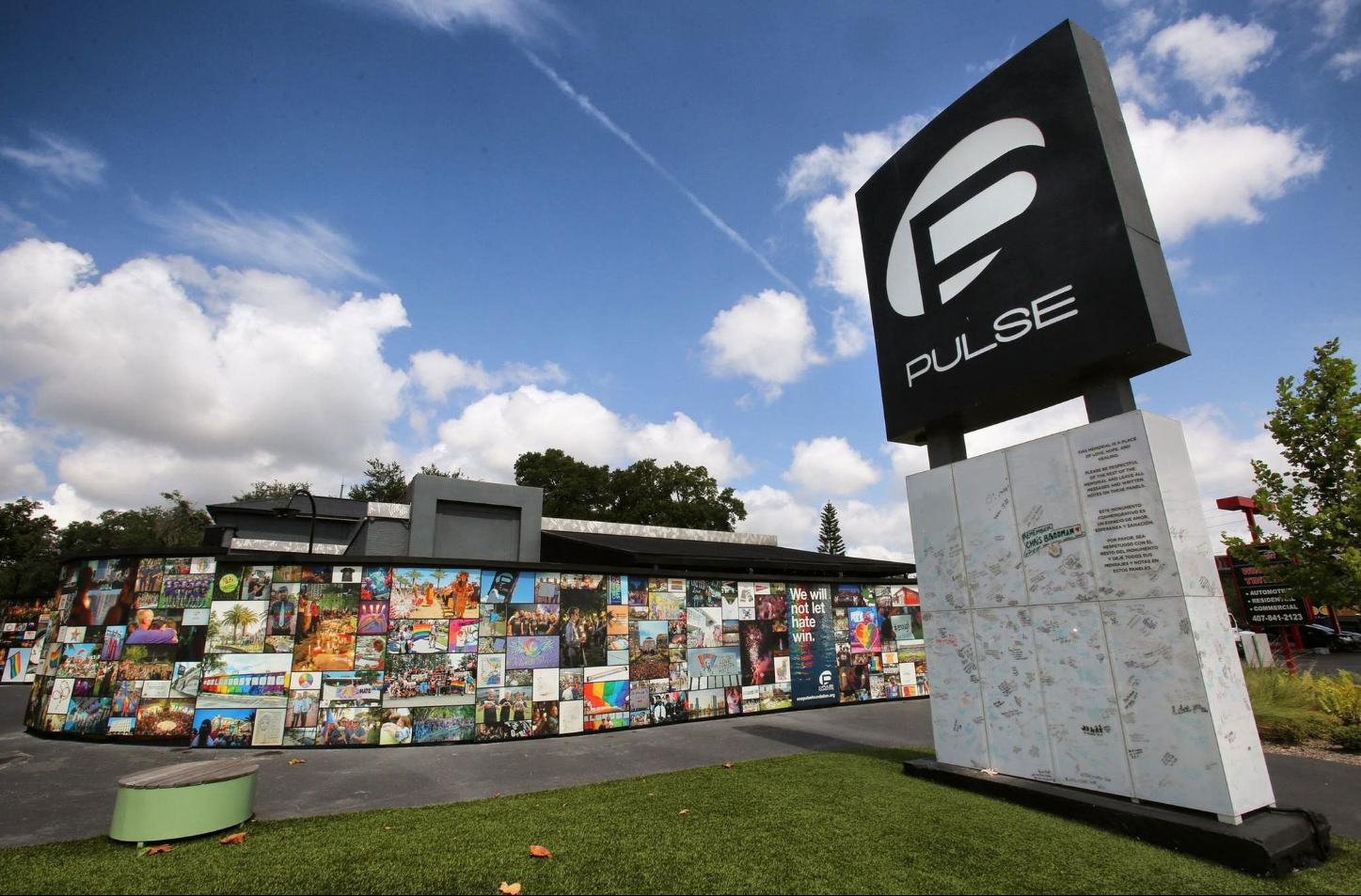
By Jay Waagmeester | ORLANDO, Fla. – Eight years have passed since 49 people were killed and 53 were wounded in a shooting at Pulse, a nightclub in Orlando.
To mark that anniversary on Wednesday, Gov. Ron DeSantis ordered state and national flags flown at half-staff as a “mark of respect for victims, their families, and the many affected by this tragedy.”
DeSantis has made the order each year since taking office and former Gov. Rick Scott did the same in 2017 and 2018. Both are Republicans.
The shooter, who pledged his loyalty to ISIS, opened fire as the gay nightclub in Orlando hosted a Latin night on June 12, 2016.
Florida Rep. Anna Eskamani, a Democrat who represents the area that included Pulse, posted the names and photos of all 49 people who were killed.
Remembering our 49 angels on this eighth year of the Pulse nightclub shooting. My heart is so heavy. Please continue to uplift their stories and honor them with action. 🕊️ pic.twitter.com/EGoDrKPKnj
— Rep. Anna V. Eskamani 🔨 (@AnnaForFlorida) June 12, 2024
The National Democratic Party released a statement criticizing Republicans’ efforts to stop gun reform, including by the NRA, and praised President Joe Biden’s efforts toward gun safety, including the Bipartisan Safer Communities Act.
“This Pride month, as we celebrate love, equality, and inclusion, this anniversary reminds us of the work left to ensure all LGBTQ+ Americans can live their lives without fear of harassment, discrimination, and violence,” the statement reads.
Vice President Kamala Harris posted about the shooting Wednesday.
Eight years ago, 49 innocent lives were taken at Pulse nightclub in Orlando, FL—the deadliest attack on the LGBTQI+ community in American history.
— Kamala Harris (@KamalaHarris) June 12, 2024
Today, we pause to grieve and remember alongside their families, their friends, and the entire LGBTQI+ community. Every person…
Brandon Wolf, a survivor of the shooting who now serves as national spokesman for the Human Rights Campaign, posted to X calling for a safer future in which young people “know they are loved and valued exactly as they are.”
Drew would have been 40 this year. He deserved to blow out those candles. He and Juan deserved a wedding. A baby shower. Retirement. To grow old.
— Brandon Wolf (@bjoewolf) June 12, 2024
They deserved so much more than militarized hate. Endless rounds. The blaze of an assault rifle tearing through the dance floor.
A national memorial was approved by Congress to honor the club in 2021, although work on a physical structure is still in progress. The City of Orlando is filling seats on the newly created Pulse Memorial Advisory Committee after a private effort to build a permanent memorial failed.
Carlos Guillermo Smith, a former member of the Florida House and Democratic candidate for the Florida Senate, posted to X that there is a need for a memorial for the shooting.
“This year’s remembrance has me reflecting on the need to create a respectful Orlando memorial for the 49, and to continue our fight to #HonorThemWithAction by creating a world they’d be proud of — a world where love conquers hate and we can all live free from gun violence.”
Florida Republican state Rep. Randy Fine took to X with the hashtag, “BombsAway.”
Today we remember that #MuslimTerror came to Florida eight years ago today, killing 49 innocents. May we stop it over there so it can never again come over here. #BombsAway
— Rep. Randy Fine (@VoteRandyFine) June 12, 2024
The mass shootings in Orlando and Parkland were a moment of change for gun law in Florida. In 2018, the Legislature approved a law to expand background checks, ban types of guns, and impose a three-day waiting period for handgun purchases. It included “red flag” language allowing authorities to remove firearms from people deemed dangerous.
Editor’s note from the Los Angeles Blade:
Community leaders, first responders and the families of the victims and survivors of the Pulse tragedy gathered together for an annual remembrance ceremony hosted by the City of Orlando. The Remembrance Ceremony allows the Orlando community to come together every year on the evening of June 12 to honor and remember the 49 angels taken, their families, the survivors, first responders, trauma teams and all those impacted by the tragedy.
The 2024 family and survivor-focused ceremony was held at the Dr. Phillips Center for the Performing Arts with doors opening at 6 p.m. and the program beginning at 7 p.m.
On X (formerly Twitter) Former Arizona State Rep. Daniel Hernandez Jr., himself a survivor of another American mass shooting on January 8, 2011, that gravely injured then Arizona U.S. Rep. Gabby Giffords and 18 others who were shot during a constituent meeting held in a Safeway supermarket parking lot in Casas Adobes, Arizona, in the Tucson metropolitan area, posted about remarks in remembrance of Pulse at a Pride event hosted in Washington D.C. Wednesday evening by Vice-President Kamala Harris.
On the anniversary of the Pulse shooting we have a beautiful tribute and speech by @VP @KamalaHarris tonight. pic.twitter.com/VTaJYQ7B1L
— Daniel Hernandez Jr (@danielforaz) June 13, 2024
******************************************************************************************

Jay covers education for the Florida Phoenix. He previously worked for the Iowa Capital Dispatch and the Iowa State Daily. He grew up in Iowa and is a graduate of Iowa State University.
******************************************************************************************
The preceding article was previously published by The Florida Phoenix and is republished with permission.
The Phoenix is a nonprofit news site that’s free of advertising and free to readers. We cover state government and politics with a staff of five journalists located at the Florida Press Center in downtown Tallahassee.
We’re part of States Newsroom, the nation’s largest state-focused nonprofit news organization.
Florida
Florida parents sue Board of Education over its book ban policy
Florida saw more books challenged for removal than any other state last year, according to data released by the American Library Association

By Mitch Perry | GAINESVILLE, Fla. – Three parents of children attending Florida public schools filed a lawsuit in federal court against the Florida Board of Education on Thursday, claiming that a 2023 education law discriminates against parents who oppose book bans and censorship.
The legislation in question (HB 1069) requires local school boards to adopt policies regarding objections by parents to the use of specific material, but these parents contend that the law “only provides a mechanism for a parent to object to the affirmative use of material; it does not provide a mechanism for a parent to object to the lack of use or discontinued use of material.”
Florida saw more books challenged for removal than any other state last year, according to data released by the American Library Association.
The lawsuit was filed in the U.S. District Court Northern Division of Florida by:
- Nancy Tray, a St. Johns County resident and parent of three students in the St. John’s School District;
- Anne Watts Tressler, a St. Johns County resident and parent of two students in the St. Johns School District; and
- Stephana Ferrell, an Orange County resident and parent of two children who attend Orange County Public Schools.
The defendants are the Florida Board of Education, along with the chair, vice chair, and all individual members of that body as well as Commissioner of Education Manny Diaz Jr.
“The law is an attempt to steal important decisions away from parents and allows those with a strong desire to withhold critical information on a variety of age-relevant topics to decide what books our kids have access to,” Ferrell said in a press release. “The State of Florida should not be able to discriminate against the voices of parents they disagree with — I deserve an equal voice in my child’s education as any other parent.”
As noted in the lawsuit, the bill sponsor, Ocala Republican Stan McClain, acknowledged on the floor of the House when the bill was being debated that the legislation would treat parents differently depending on whether they objected to or supported the availability of school materials.
Gainesville Democratic Rep. Yvonne Hinson remarked to McClain that there was “a method on several pages of your bill for a parent to complain about a book. But is there a method for the other 99% of the parents to request the book?”
McClain said there was not, and that he would not consider including such a method.
‘Shut Up!’
The lawsuit goes into detail describing how Ferrell, the Orange County mother, was unsuccessful in fighting the removal of a book called “Shut Up!” by Marilyn Reynolds at Timber Creek High School, removed in the summer of 2023 due to the objection of a single parent.
Ferrell objected to the removal of that title, but was informed on Aug. 30, 2023, that the district had rejected her objection because “[o]nly the challenger can appeal the determination of the School or District to not remove the book to the board. You do not have the standing to file with this board. … The statute does not expressly give the authority to parents to challenge a removal of a book.”
Ferrell sought access to the state review process and submitted her objection to the State Review Liaison on Sept. 26, 2023. She finally received a response on Feb. 27, 2024, informing her that “the Department has received multiple requests for the Appointment of a Special Magistrate. You will receive a response in writing in the near future.”
The very next day, the department wrote to Ferrell that “[a] special magistrate is not available to contest a district’s decision to remove material or for the purpose of providing clarification on the law. As such, your request has been dismissed.”
The lawsuit goes on to say: “Parent Ferrell’s request was dismissed because she holds the State’s disfavored view.”
“Florida has become a national leader in book banning, garnering mass attention for the unprecedented number of books that have been removed from our public schools,” said Samantha Past, a staff attorney with the ACLU of Florida, one of three law firms representing the parents (along with the Southern Poverty Law Center and the Democracy Forward Foundation).
“A review process that is available only to parents with certain viewpoints violates the First Amendment. Denying parents an appropriate avenue to challenge censorship is undemocratic, and stifling viewpoints the state disagrees with is unlawful. Ultimately, these actions perpetuate the statewide attack on members of the Black, Brown, and LGBTQ+ communities in an attempt to erase them from our history books,” Past continued.
2,700 books
Nearly 2,700 books were targeted for restriction or removal in Florida schools and libraries in 2023, according to the American Library Association in a report issued in March. That was 1,200 more than the state with the second-most challenges, Texas.
Earlier this year, Gov. Ron DeSantis acknowledged that giving parents the right to object to books and other materials in public schools has led to confusion at school districts throughout the state, but he declined to criticize state policy.
“If you have a kid in school, OK. But if you’re somebody who doesn’t have a kid in school and you’re going to object to 100 books, no, I don’t think that that’s appropriate,” he said.
DeSantis earlier this year signed into law a bill that caps the number of books that individuals who don’t have children in Florida’s public-school systems at one per month. The bill’s original language would have charged a $100 fee for a person who brought an unsuccessful challenge, but that was stripped from the final legislation.
Sydney Booker, the communications director with the Florida Department of Education, responded to the lawsuit by issuing this statement: “There are no books banned in Florida. However, sexually explicit material and instruction are not suitable for classrooms.”
******************************************************************************************

Mitch Perry has covered politics and government in Florida for more than two decades. Most recently he is the former politics reporter for Bay News 9. He has also worked at Florida Politics, Creative Loafing and WMNF Radio in Tampa. He was also part of the original staff when the Florida Phoenix was created in 2018.
******************************************************************************************
The preceding article was previously published by the Florida The Phoenix and is republished with permission.
The Phoenix is a nonprofit news site that’s free of advertising and free to readers. We cover state government and politics with a staff of five journalists located at the Florida Press Center in downtown Tallahassee.
We’re part of States Newsroom, the nation’s largest state-focused nonprofit news organization.
Florida
Tampa & other Florida cities raise Pride flag for Pride Month
Tampa Mayor Jane Castor speaking of LGBTQ+ people said. “They are neighbors, our friends, and our family. It is our community”
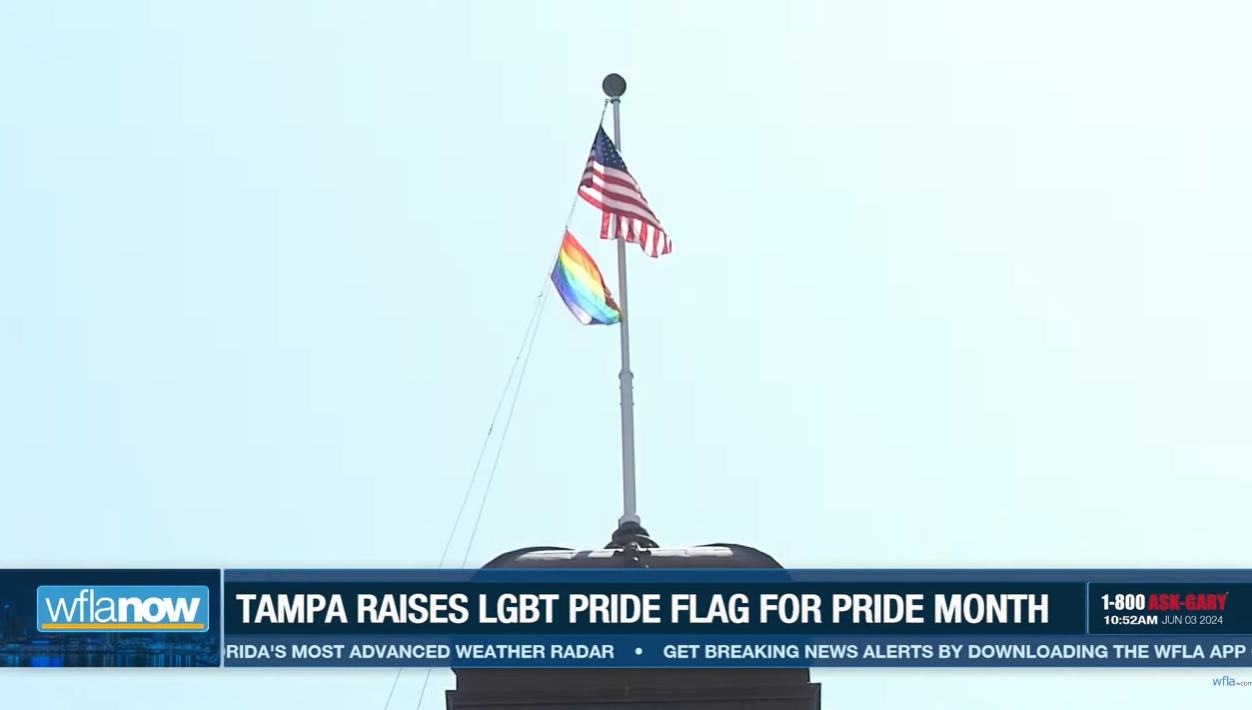
TAMPA, Fla. – In a ceremony Monday at Tampa’s Old City Hall City officials hoisted the LGBTQ+ Pride Flag underneath the American Flag officially kicking off the city’s commemoration of LGBTQ+ Pride Month 2024.
“Those individuals are our police officers, our firefighters, our paramedics, the individuals that protect our country down at MacDill Air Force Base, they are our teachers, our nurses,” Tampa Mayor Jane Castor said. “They are neighbors, our friends, and our family. It is our community.”
Tampa Public Radio WMNF 88.5 FM reported that several Tampa Bay area cities have raised the LGBTQ+ Pride flags over city buildings this month. But that would have been illegal if a bill that died in this year’s Florida Legislature had instead become law.
This past Saturday the city of Gulfport raised the Pride flag over its public library. It came after a short ceremony of speeches honoring the city’s commitment to equality and before a day-long block party celebration of Pride, WMNF also reported.
“I think there’s two parts of it one. We don’t need Tallahassee legislators trying to diminish and negatively impact our LGBTQ community. That’s first off. Secondly is, I’m a strong believer in local control. And cities and counties and local governments should have the ability to make some of those basic decisions for themselves, without big government from Tallahassee interfering,” Pinellas County Commissioner Charlie Justice, a former member of the Florida House said.
Related:
Florida
St. Petersburg Fla. Rainbow street mural vandalized by two drivers
It’s going to cost the City of St. Petersburg $1100 to restore. The City aims to have the mural repainted in time for Pride month festivities
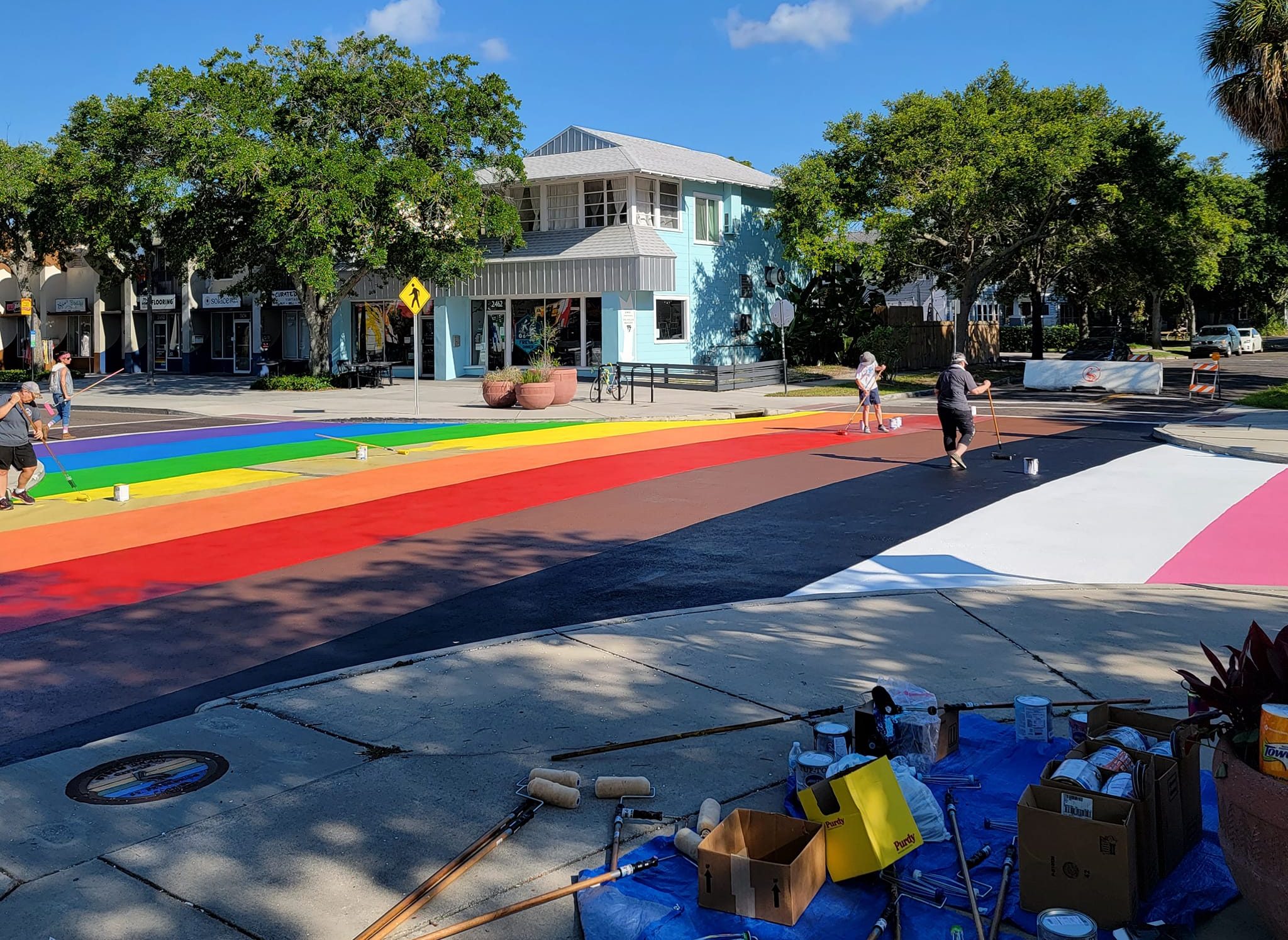
ST. PETERSBURG, Fla. – The Progressive Pride Street Mural at the 2500 Central Avenue roundabout in the Grand Central District was defaced and damaged in two separate incidents earlier this month. The St. Petersburg Police Department is seeking the public’s assistance to facilitate the arrest of the drivers of the vehicles involved.
The first occurred on May 17th at 9:36 a.m. when a truck accelerated through the mural. The second incident happened on May 22nd at 2:41 a.m. involving a blue two-door vehicle doing doughnuts on the mural.
WTVT FOX 13 Tampa Bay reported that Lee Manuel, the owner of Cocktail St. Pete, a bar just down the street from the mural, said just a few days later, someone did donuts on the mural, damaging it more. A bar across the street from the mural seemed to capture it early Wednesday morning around 2:45 a.m.
Investigators have no reason to believe the incidents are related.
It’s going to cost the City of St. Petersburg $1100 to restore. The City aims to have the mural repainted in time for Pride month festivities.
Anyone with information on the blue vehicle pictured in the video [see Fox 13 report], please contact the St. Petersburg Police at 727-893-7780 or text SPPD + your tip to TIP411.
Florida
Florida sues over new regulations protecting gender-affirming care
Florida’s ban on gender-affirming care for minors & restrictions for adults are also wrapped up in a legal challenge in a federal court
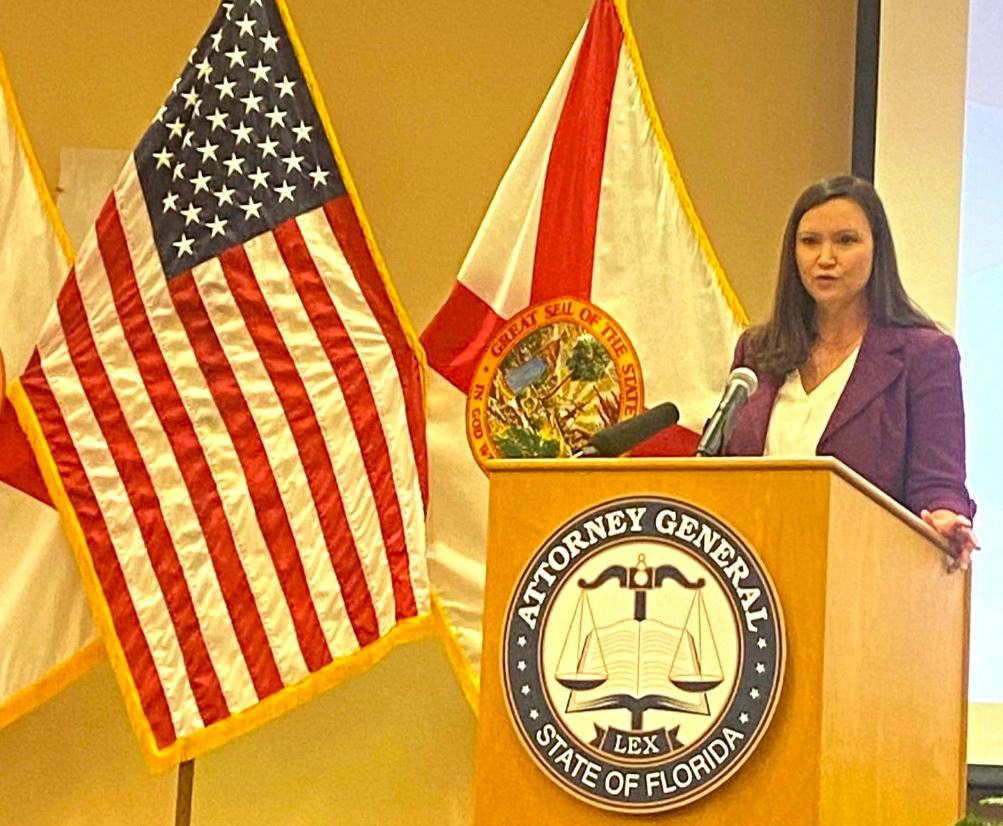
By Jackie Llanos | TALLAHASSEE, Fla. – Republican State Attorney General Ashley Moody filed a lawsuit Monday against new Biden administration regulations defending access to common medical treatments for transgender and gender non-conforming people.
The regulations that the Department of Health and Human Services (HHS) issued Monday state that blanket exclusions in services that single out transgender people are “presumptively discriminatory on the basis of sex.” Those guidelines for sex-based discrimination also encompass gender identity, according to the regulations.
The agency crafted specific provisions related to gender-affirming care “given the widespread discriminatory denial of care for such services and its direct connection to an individual’s transgender status.”
While the federal regulations are set to go into effect on July 5, Moody is asking the U.S. District Court of the Middle District of Florida in Tampa to throw out the rules, which seemingly go against the state’s ban on gender-affirming care, such as puberty blockers, for minors and the restrictions for what kind of providers can treat trans adults seeking treatment for gender dysphoria.
For the duration of the case, Moody requested that the court issue a temporary injunction exempting Florida agencies from enforcing the rules.
Florida’s gender-affirming care landscape
“Florida passed a law to protect our children from dangerous, irreversible gender-transition drugs and surgeries,” Moody wrote in a Tuesday press release. “Now, Biden and his federal bureaucrats are trying to go around our child-protection law to force the state to pay for puberty blockers and gender-transition surgery for children. These rules trample states’ power to protect their own citizens and we will not stand by as Biden tries, yet again, to use the force of the federal government to unlawfully stifle Florida’s effort to protect children.”
However, the regulations from the federal agencies don’t state that a healthcare provider would have to give gender-affirming care to a trans patient. Instead, it states that providers should determine treatment on a case-by-case basis.
“Nothing in this rule impedes covered entities from taking nondiscriminatory actions based on current medical standards and evidence, such as making decisions about the timing or type of protocols appropriate for care. The rule does not (and cannot) require a specific standard of care or course of treatment for any individual, minor or adult,” the rules state.
But Florida’s ban on gender-affirming care for minors and the restrictions for adults are also wrapped up in a legal challenge in a federal court in Tallahassee. The trial for the case brought by transgender children, their parents and transgender adults took place in December but the judge has yet to rule.
Equality Florida, an LGBTQ+ advocacy group, condemned the lawsuit in a statement to Florida Phoenix.
“DeSantis and Attorney General Moody’s lawsuit is another taxpayer-funded distraction so Floridians won’t notice that their insurance rates continue to skyrocket as Florida has the highest rate of inflation in the country and the lowest rate of teacher pay,” the group wrote. “Everyone deserves respect and the freedom to seek best-practice healthcare, but our Governor is hellbent on denigrating transgender Floridians and overruling parents’ ability to obtain essential care for their transgender child.”
Complaint arguments
Moody filed the 84-page complaint — with dozens of additional exhibits and other documents — on behalf of the state of Florida, Florida Agency for Health Care Administration, the Florida Department of Management Services and the Catholic Medical Association and its director Mario Dickerson.
The defendants were listed as: Department of Health and Human Services; Xavier Becerra, in his official capacity as Secretary of the Department of Health and Human Services; Melanie Fontes Rainer, in her official capacity as the Director of the Office for Civil Rights; Centers for Medicare and Medicaid Services; Chiquita Brooks-Lasure, in her official capacity as Administrator of the Centers for Medicare and Medicaid.
In the complaint, she argues that the Centers for Medicare and Medicaid Services and the Office for Civil Rights (OCR) of the Department of Health and Human Services violated the Administrative Procedure Act and the Spending Clause because the agencies didn’t have the power to change the definition of sex-based discrimination and tie federal funding based on states’ compliance with those rules.
“Under the OCR Rules, Florida now faces the untenable choice of surrendering its power to protect the health and safety of Floridians or losing billions of dollars in federal funding without adequate notice that this would be part of the bargain,” Moody wrote in the complaint.
The lawsuit also includes arguments that the regulations would violate the Catholic Medical Association (CMA) members’ freedom of religion and speech.
“CMA and its members hold the position that gender-transition procedures are unethical and dangerous. Providing, facilitating, referring for, or endorsing gender-transition efforts violates their medical views, their core religious beliefs, and their oath to ‘do no harm,’” Moody wrote in the lawsuit. “CMA’s members have medical and ethical positions contrary to the 2024 Rules’ requirements, and they also have overlapping religious objections. It is within CMA’s advocacy mission to advocate and litigate for its members’ right to the conscientious and faithful practice of medicine.”
Just last month, Moody joined other states in challenging new Biden administration rules protecting transgender people from discrimination in schools, colleges, and universities.
******************************************************************************************

Jackie is a recent graduate of the University of Richmond. She has interned at Nashville Public Radio, Virginia Public Media and Virginia Mercury.
******************************************************************************************
The preceding article was previously published by the Florida Phoenix and is republished with permission.
The Phoenix is a nonprofit news site that’s free of advertising and free to readers. We cover state government and politics with a staff of five journalists located at the Florida Press Center in downtown Tallahassee.
We’re part of States Newsroom, the nation’s largest state-focused nonprofit news organization.
Florida
Homeless trans woman in Miami beaten to death in her sleep
“Whenever a trans person is murdered with such brutality, the question should be asked about whether or not this was a hate-motivated crime”
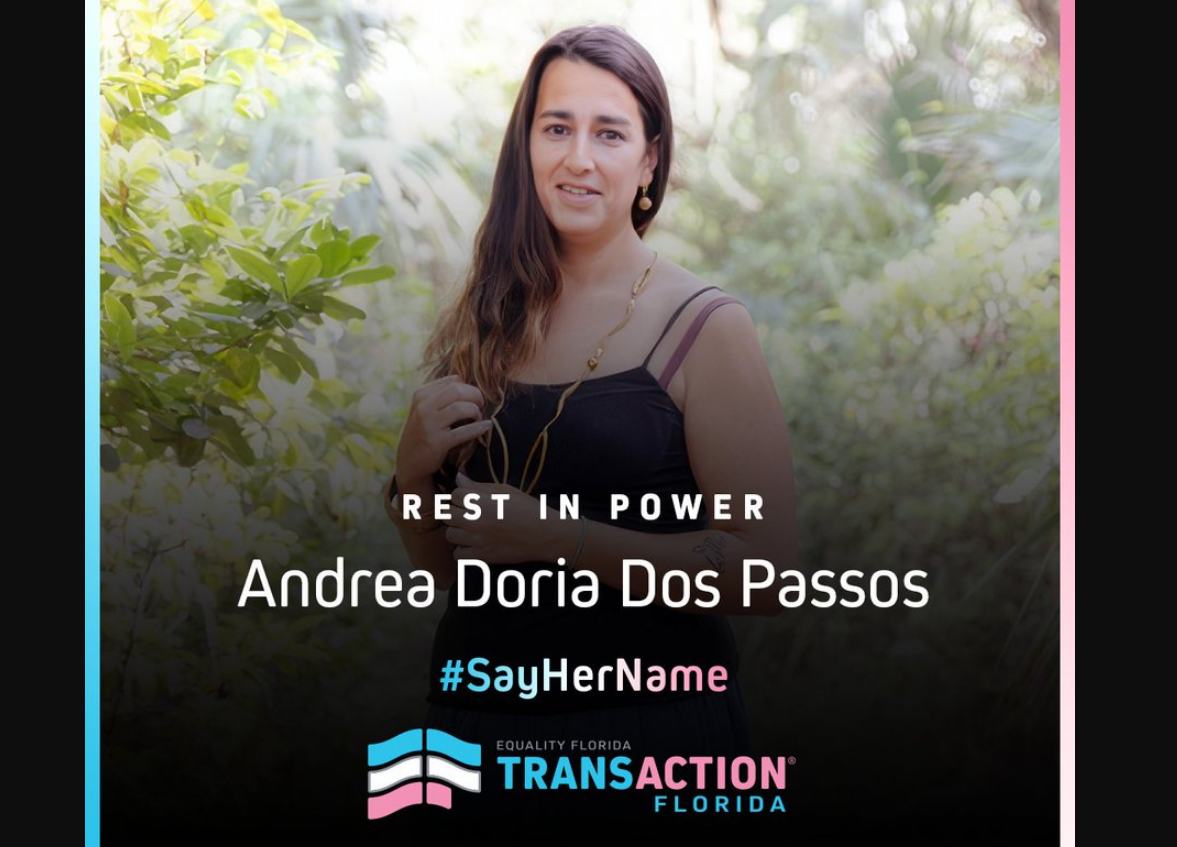
MIAMI BEACH, Fla. – Gregory Fitzgerald Gibert, 53, who was out on probation, is charged with the second-degree murder of 37-year-old Andrea Doria Dos Passos, a Latina trans woman who was found deceased in front of the Miami Ballet company facility by a security guard this past week.
According to a Miami Beach Police spokesperson the security guard thought Dos Passos was sleeping in the entranceway around 6:45 a.m. Tuesday and when he went to wake her he discovered the blood and her injuries and alerted 911.
She was deceased from massive trauma to her face and head. According to Miami Beach police when video surveillance footage was reviewed, it showed Dos Passos lying down in the entranceway apparently asleep. WFOR 4 – CBS News Miami reported: In the early morning hours, a man arrived, looked around, and spotted her. Police said the man was dressed in a black shirt, red shorts, and red shoes.
At one point, he walked away, picked up a metal pipe from the ground, and then returned. After looking around, he sat on a bench near Dos Passos. After a while, he got up and repeatedly hit her in the head and face while she was sleeping, according to police.
“The male is then seen standing over her, striking her, and then manipulating her body. The male then walks away and places the pipe inside a nearby trashcan (the pipe was found and recovered in the same trashcan),” according to the arrest report.
Police noted that in addition to trauma on her face and head, two wooden sticks were lodged in her nostrils and there was a puncture wound in her chest.
Victor Van Gilst, Dos Passos’s stepfather confirmed she was trans and experiencing homelessness.
“She had no chance to defend herself whatsoever. I don’t know if this was a hate crime since she was transgender or if she had some sort of interaction with this person because he might have been homeless as well. The detective could not say if she was attacked because she was transgender,” said Van Gilst.
“She has been struggling with mental health issues for a long time, going back to when she was in her early 20s. We did everything we could to help her. My wife is devasted. For her, this is like a nightmare that turned into reality. Andrea moved around a lot and even lived in California for a while. She was sadly homeless. I feel the system let her down. She was a good person,” he added.
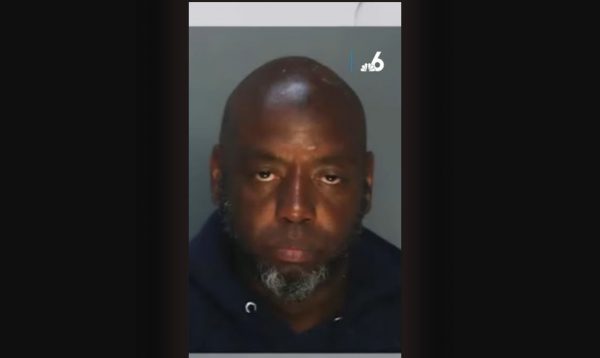
City of Miami Police arrested Gibert, collected his clothing, noting the red shorts were the same type in the video and had blood on them. Blood was also found on his shoes, according to police. He was taken into custody and charged.
“The suspect has an extensive criminal record and reportedly was recently released from custody on probation for prior criminal charges. Police apprehended the suspect in the City of Miami and the investigation is currently ongoing. This case is further evidence that individuals need to be held accountable for prior violent crimes for the protection of the public. We offer our sincere condolences to the family and friends of the victim,” Miami Beach Mayor Steve Meiner said in a statement.
Joe Saunders, senior political director with LGBTQ rights group Equality Florida, told the Miami Herald that “whenever a transgender person is murdered, especially when it is with such brutality, the question should be asked about whether or not this was a hate-motivated crime.”
Florida
Gov. DeSantis denounces ‘weaponization’ of book challenges
‘They’re going to be holding many teachers accountable,’ he said signing a bill restricting nonparents to 1 book challenge per month
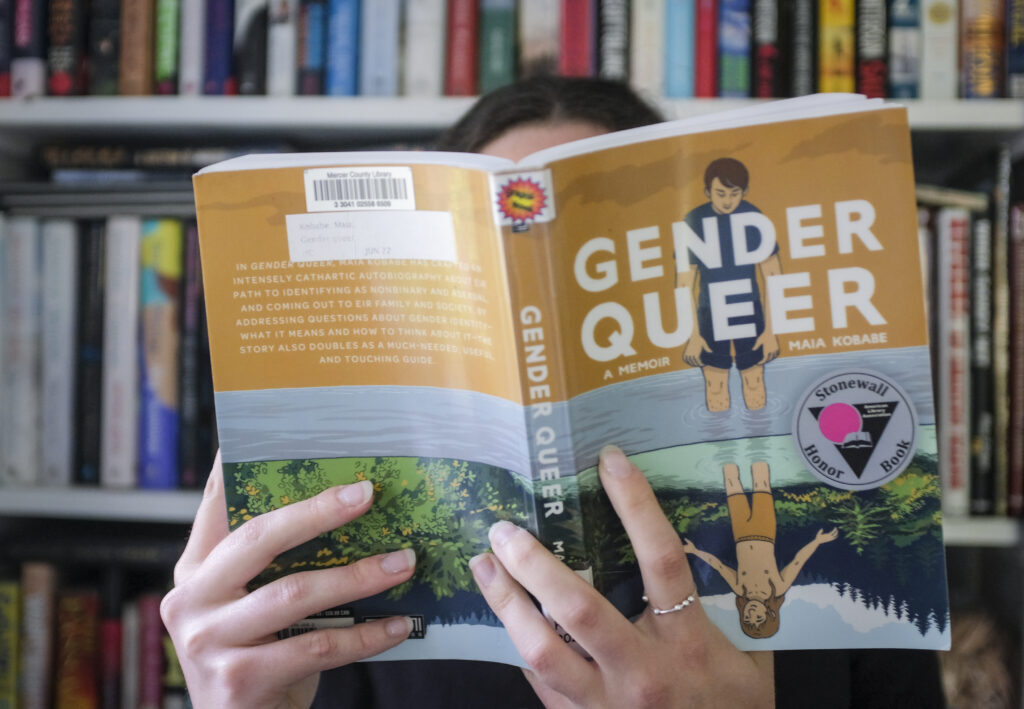
By Michael Moline | TALLAHASSEE, Fla. – The DeSantis administration plans to punish teachers and principals deemed to be exploiting public school book challenges to, in the governor’s view, “weaponize” Florida’s parental rights laws.
DeSantis leveled that charge Monday during a news conference in Pensacola. On Tuesday, he raised it again during a second news conference in Jacksonville, where he signed legislation restricting nonparents to one book challenge per month.
The challenges come under state law allowing anyone to complain about the content of classroom materials they deem objectionable or pornographic. The laws require removal of challenged books pending reviews that can take considerable time. DeSantis began trying to tone down the situation in February, in advance of the 2024 legislative session.

“Manny, in the Department of Education, they’re going to be holding many principals or teachers accountable who are weaponizing this,” DeSantis said Tuesday, referring to Education Commissioner Manny Diaz Jr.
DeSantis cited Sarasota County teachers who “papered over every book in the classroom, saying, ‘Oh! You can’t have books! The state’s not letting me show you books! That’s a lie. That’s not true. That’s performative.
“And so, that’s somebody who’s entrusted to teach kids putting their political agenda over the best interests of the students’ education and their access to learning. That’s wrong; that’s not going to stand in the state of Florida. So, we don’t have time for your activism; we don’t have time for your nonsense. We have a process in place to empower parents,” the governor said.
Teachers told the Sarasota Herald Tribune in January 2023 that they feared prosecution if they put students in contact with unvetted books.
The Phoenix asked the administration for an explanation of any investigations launched or punishment inflicted on school employees but hasn’t heard back yet.
Rebuttal
Florida Education Association President Andrew Spar issued a rebuttal in the form of a written statement.
“It’s important to remember that Gov. DeSantis’ full throated support is the reason why fringe groups who do not represent the majority of Floridians and often do not have students in the classroom have felt so comfortable removing books off shelves and making Florida the leader in the nation on book banning,” Spar said.
“This rule does nothing to fix the vague language that caused the issue in the first place, no matter how much the Governor and Commissioner Manny Diaz try to shift blame. Schools, teachers, and media specialists have long been asking for guidance on this issue and once again, instead of providing students what they need, Florida’s elected and appointed officials decide to play the blame game instead of taking responsibility,” Spar continued.
The American Library Association has reported that the bulk of the book challenges nationally come from conservatives.
“Recent censorship data are evidence of a growing, well-organized, conservative political movement, the goals of which include removing books about race, history, gender identity, sexuality, and reproductive health from America’s public and school libraries that do not meet their approval,” the association says in a written statement on its website.
“Using social media and other channels, these groups distribute book lists to their local chapters and individual adherents, who then utilize the lists to initiate a mass challenge that can empty the shelves of a library,” the association continues.
Florida saw 2,672 titles challenged during 2023, it says.
Meanwhile, PEN America recorded 1,406 book ban cases in Florida during the 2022-2023 school year, which accounted for 40% of the national total.
One challenge per customer
The new law (HB 1285) restricts challenges by people without children in a school district to one per month, while parents and guardians remain free to issue unlimited challenges.
That would still allow 12 challenges by nonparents per year, Diaz observed during Tuesday’s news conference. However, “Anyone who creates a cottage industry of going around the state and just creating challenges just to gunk up the system and put schools in arrears as far as reviewing these books, that person won’t be able to do it anymore,” Diaz said.
DeSantis complained that the news media have inflated challenges against classic books and biographies of important Americans while playing down other materials, including LGBTQ content, that he considers unsuitable for young kids or even pornographic.
“They’ve said, ‘Oh, you know, you’re not having Rosa Parks’ — and yet that’s on the summer reading list. Things about Hank Aaron, a book of the month from the Department of Education. So that’s clearly a bad-faith challenge, just trying to create a narrative,” DeSantis said.
“Some of those bad-faith actions have been done from people within the school system who are doing that to try to create a narrative. So, Manny will be able to hold those folks accountable because clearly there’s nothing in Florida law that would tell you to do that,” he continued.
Spar observed: “What Gov. DeSantis and Commissioner Manny Diaz always seem to forget when they attack public schools is that they have failed public schools through their punitive policies that have worsened the teacher and staff shortage and kept teacher and staff pay low. It is clear their political agenda is more important than the needs of Florida’s students.”
**************************************************************************************

Michael Moline has covered politics and the legal system for more than 30 years. He is a former managing editor of the San Francisco Daily Journal and former assistant managing editor of The National Law Journal.
**************************************************************************************
The preceding article was previously published by the Florida Phoenix and is republished with permission.
The Phoenix is a nonprofit news site that’s free of advertising and free to readers. We cover state government and politics with a staff of five journalists located at the Florida Press Center in downtown Tallahassee.
We’re part of States Newsroom, the nation’s largest state-focused nonprofit news organization.
Florida
Settlement & clarification reached in Florida’s Don’t Say Gay law
The settlement restores ability of students, teachers, & others to speak & write freely about sexual orientation & gender identity
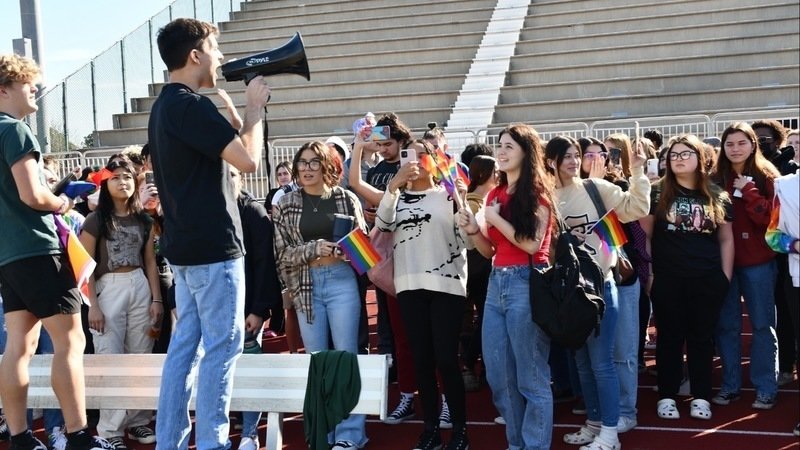
ORLANDO, Fla. — A settlement reached with the Florida State Board of Education, Florida Department of Education, and various school districts, and the attorneys and plaintiff’s clarifies what is allowed in Florida classrooms under the state’s notoriously controversial “Parental Rights in Education” law colloquially referred to as the “Don’t Say Gay” law.
The Plaintiffs’ lawyers at Kaplan Hecker & Fink LLP and the National Center for Lesbian Rights filed the agreement with the United States Court of Appeals for the Eleventh Circuit earlier today. The agreement effectively nullifies the most dangerous and discriminatory impacts of the law,” and makes clear that the law must be applied neutrally and is no license to discriminate against or erase LGBTQ+ families.
Cameron Driggers and Jack Petocz, who led the statewide student protest against the ‘Don’t Say Gay’ law in March, 2022, reacted in a text message to the Blade saying:
“LGBTQ+ students and allies are breathing a sigh of relief today in response to the news that litigation has successfully mediated some of the most extreme aspects of Governor DeSantis’ “Don’t Say Gay” legislation. Just about two years ago, we led a state-wide school walkout all across the state of Florida in response to that bill. We knew then that it infringed on the basic civil liberties of students and teachers, and we look forward to future challenges to other pieces of authoritarian legislation.”
“The settlement restores the ability of students, teachers, and others in Florida schools to speak and write freely about sexual orientation and gender identity in class participation and schoolwork,” the legal teams noted in a statement. “It also restores safeguards against bullying on the basis of sexual orientation and gender identity, and reinstates Gay-Straight Alliances (GSAs). Critically, the settlement also requires the State Board of Education to send today’s agreement to every school district, and to make clear that the settlement reflects the considered position of the State of Florida on the scope and meaning of this law.” the statement continued.
Specifically, the historic settlement agreement clarifies the following:
- Classroom references. The law does not prohibit references to LGBTQ+ persons, couples, families, or issues, including: in literature, in classroom discussion (such as student-to-student speech or teachers responding to students’ questions), in students’ academic work product or teachers’ review of the same, in teachers identifying same-sex or transgender spouses or partners, or in any other context in which a teacher is not “instructing” on the subject of sexual orientation or gender identity.
- Non-discrimination. The law does not target LGBTQ+ persons, couples, families, or issues. Rather, it requires neutrality and prohibits “classroom instruction” on the subjects of sexual orientation or gender identity, whether the subject addresses heterosexuality, homosexuality, bisexuality, cisgender identities, transgender identities, or otherwise. It would violate the law, then, to instruct that heterosexuality is superior to other sexualities, or that cisgender identities are superior to transgender identities.
- Anti-bullying and acceptance. The law does not prohibit instruction or intervention against bullying on the basis of sexual orientation or gender identity, nor does it require the removal of safe space stickers or elimination of safe space areas for the benefit of LGBTQ+ persons.
- Extracurricular activities. The law does not prohibit Gay-Straight Alliances, including student attendance or participation by teachers or other faculty members. The law also does not prohibit book fairs that include LGBTQ+ focused books, musicals or plays with LGBTQ+ references or characters, participation and expression by LGBTQ+ persons in other extracurricular events like school dances, or the wearing of clothing that is affiliated with LGBTQ+ persons or issues or that does not conform with one’s perceived gender identity.
- Library books. The law does not apply to library books, so long as those books are not being used in the classroom to instruct on the subjects of sexual orientation or gender identity.
- Third parties. The law does not apply to non-school-personnel, including parents, other family members, and guest lecturers, so long as the school is not delegating to such third party the role of providing classroom instruction on the subjects of sexual orientation or gender identity.
“We made a promise to LGBTQ+ families, students, and educators across the state to ensure that they received equal dignity under the law, and to protect our schools from a censorship agenda that harms the education system as a whole,” said Equality Florida Executive Director Nadine Smith. “Florida has already endured nearly two years of book banning, educators leaving the profession, and safe space stickers being ripped off of classroom windows in the wake of this law cynically targeting the LGBTQ+ community. This settlement is a giant step toward repairing the immense damage these laws and the dangerous political rhetoric has inflicted on our families, our schools, and our state. The message to school districts, superintendents, and teachers alike is clear: Protect every student and respect every family.”
In early 2022, Republican Governor Ron DeSantis signed HB 1557, commonly known as the “Don’t Say Gay” bill. The Plaintiffs sued the next day, alleging that the law was impermissibly vague, was obviously motivated by hostility to LGBTQ+ persons and families, and created an enforcement system that enabled discrimination and discouraged efforts to fight it. The Plaintiffs claimed that the law violated their rights to equal protection, due process, and free speech. The Plaintiffs litigated aggressively, and engaged in months of negotiations with the State’s lawyers to forge today’s historic settlement.
“This settlement is a huge victory for our community, both in Florida and nationally. It not only reverses the censorship and intimidation created by Florida’s “don’t say gay or trans” law, it codifies important new protections that were not previously clearly established, such as the right of teachers and staff to talk about LGBTQ people, to put safe space stickers in their classrooms, and to be open about their own LGBTQ identities or same-sex partners, just as straight teachers are able to be,” said NCLR Legal Director Shannon Minter in a phone statement to the Blade. “I am thrilled to be part of this historic moment, which is a strong sign that the tide of anti-LGBTQ hatred and persecution is turning, thanks to the hard work of so many.”
Human Rights Campaign National Press Secretary Brandon Wolf issued the following statement:
“This is more evidence: the tide is turning on the anti-LGBTQ+ agenda. In state legislatures and courtrooms in Florida and beyond, discriminatory policies are starting to collapse. The DeSantis administration was forced to acknowledge that their vague, broad law was having sweeping consequences. And this settlement makes clear that every student deserves a safe, welcoming school environment where their families are treated with the respect that they deserve – and that what applies to LGBTQ+ people must apply to others equally. Thank you to the legal team and courageous plaintiffs for challenging this discriminatory law.”
-
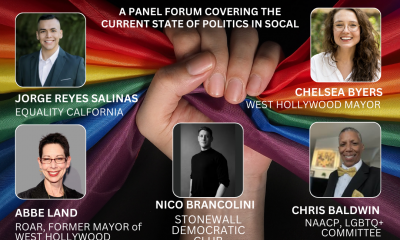
 Features4 days ago
Features4 days agoLos Angeles Blade kicks off Free Community Event Series with an informative political panel of government and advocacy group leaders
-

 a&e features2 days ago
a&e features2 days agoMusical Mondays, a mainstay in WeHo nightlife, celebrates 16 years
-

 Arts & Entertainment1 day ago
Arts & Entertainment1 day ago‘Bring it to Brunch’ returns to West Hollywood
-

 California10 hours ago
California10 hours agoSouth Park provides green space to a predominantly Latino community
-

 Myanmar1 day ago
Myanmar1 day agoLGBTQ+ advocacy group joins Myanmar earthquake relief effort
-

 a&e features1 day ago
a&e features1 day agoPeppermint thrives in the spotlight
-

 National5 hours ago
National5 hours agoLatest update in the case of wrongfully deported gay, Venezuelan make-up artist

